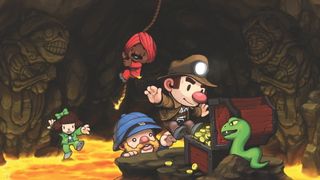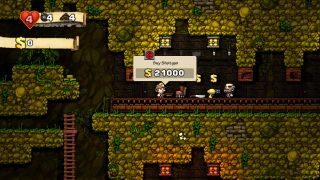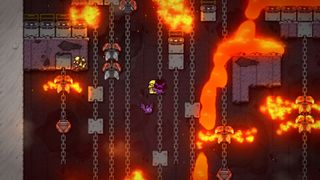My favorite Spelunky character is a masterclass in roguelike risk versus reward: "Stealing in games is fun in the same way running across the top of the screen is in Super Mario"
Interview | The game's creator Derek Yu explores the workings of Spelunky's grumpy, and deadly, shopkeepers

Stealing in video games has fascinated me for years. There's likely something deeper to it, about committing nefarious acts in virtual spaces with zero repercussions, but I've always loved the thrill of pickpocketing unsuspecting NPCs from right under their noses before scampering off into the shadows to revel in the spoils. To this end, Thief would become a firm favorite during my formative years – but my very first experience of theft in games came in 1993.
After sprinting out of the Mabe Village shop with an overpriced Bow in The Legend of Zelda: Link's Awakening (980 Rupees? Come on!) I felt like a stone cold hero. That is, until my name changed from 'Joe' to 'THIEF' during every single interaction afterwards, my offense capitalized and all. At just seven years old, a video game had never made me feel guilt in this way ever before, but more than this, a video game had never remembered my actions in this way either. Should you ever return to the same Mabe Village tool shop down the line, an angry shopkeeper awaits, in turn scalding you for your misgivings, before blasting you to instant death with a fatal electric shock.
Games like Skyrim, Fallout 3, Dishonored, Starfield and Baldur's Gate 3 have all pushed stealing from NPCs to new levels over the last decade or so, but my absolute favorite example since Link's Awakening is Spelunky. Similar to its Zelda forefather, pilfering items from shopkeepers in Spelunky not only turns the proprietors against you in the moment, but sees the angry owners lying in wait till you next cross paths – posting wanted posters all over levels the longer you manage to elude their hunt.
"Stealing came about naturally once I decided that Spelunky should have shops," says creator Derek Yu. "And there was definitely some inspiration from traditional roguelikes, where stealing from shops is part of a bigger design philosophy that allows players to do whatever they want if it makes sense within the game's basic rules. In general, I love games that give players a lot of agency and make them think hard about their choices. When the stakes are higher, I feel more engaged."
Stealing a living

"There was probably some inspiration from GTA's wanted system there, to be honest"
I'm not ashamed to admit that I've felt Spelunky's stakes so high that I've reacted to an angry shopkeeper by dancing around my living room in a panic, screaming at my TV and frantically bashing jump in my bid to evade my pursuant. Escaping the invariable ire of an angry shopkeeper is never not a frantic ordeal, and yet while simply not swiping their goods is the most straightforward way to avoid the situation, I simply cannot help myself every time that opportunity presents itself – be that in Spelunky or its 2020 sequel, Spelunky 2.
Yu recalls being surprised by the fact Link's Awakening let you steal at all, and describes the solution to it as "elegant". Yu likewise spent a concerted amount of time trying to steal items in NetHack in his younger years, and his favorite method for doing so was teaching his pet cat to swipe items and bring them outside for him. As you might expect, all of this inspired Yu when it came to designing his shopkeepers, including the hilarious Shopkeeper's Union, the aforementioned wanted posters, and the forgiveness features that really came into play in Spelunky 2.
"I really liked the idea of shopkeepers chasing you through the run once you've wronged them," says Yu. "There was probably some inspiration from GTA's wanted system there, to be honest. But it was very difficult to be forgiven in Spelunky 1, to the point where I'm sure there were players that didn't even realize it was possible. So in Spelunky 2, it's much easier to be forgiven for lesser crimes, but at the same time, if you become too wanted, the shopkeepers can form posses to attack you mid-level."
Sign up to the GamesRadar+ Newsletter
Weekly digests, tales from the communities you love, and more

Spelunky 2 is so ambitious that even Derek Yu doesn't know what you'll find in its darkest depths
"I came up with the shopkeeper posses during the development of Spelunky 2, as part of my overall goal of building and expanding on the original game," Yu adds. "I wanted to do this with the lore as well as the mechanics. So if you play the game enough, you can start to infer that the posse rooms are basically a bunch of clones planning to ambush you in revenge. It's just another way to make the world feel more alive in an organic way."
It's that last point that I think speaks to me most. Again, despite my age, I still remember being impressed by Link's Awakening's ability to remember my actions, teaching me that, yes, breaking the rules can have repercussions – in many ways an old school variation of fuck around and find out. In the likes of Skyrim, stealing from one group hours earlier, and then later being pursued by a random hitman who carries the contract for your death is neat; while Dishonored and its sequel are exactly what I pictured a modern day Thief would look like back in the day, no disrespect to Eidos' 2014 reimagining.
Yu in turns offers his own interpretation of why virtual kleptomania is so appealing. "I think stealing in games is fun in the same way that it's fun to run across the top of the screen in Super Mario Bros. or find a cheesy strategy against a Souls boss," he says. "It's like, "Whoa, I can do that?! That actually works?" Human beings have an affinity for pushing boundaries and video games are a great place to explore these feelings safely."
Check out the best roguelikes plumbing the depths right now

Joe is a Features Editor at GamesRadar+. With over seven years of experience working in specialist print and online journalism, Joe has written for a number of gaming, sport and entertainment publications including PC Gamer, Edge, Play and FourFourTwo. He is well-versed in all things Grand Theft Auto and spends much of his spare time swapping real-world Glasgow for GTA Online’s Los Santos. Joe is also a mental health advocate and has written a book about video games, mental health and their complex intersections. He is a regular expert contributor on both subjects for BBC radio. Many moons ago, he was a fully-qualified plumber which basically makes him Super Mario.
Most Popular


